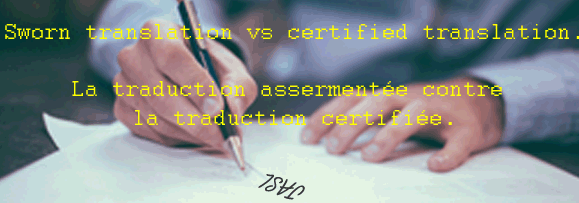When business is conducted between two countries, translations of numerous documents and legal instruments are required by French or foreign authorities. This article clarifies the different stages and procedures that are required.
Sworn translation
A translation under oath, or a sworn translation, is prepared by an Expert translator associated with a Court of Appeal, or Court of Cassation, who certifies that it is a true translation of the original. This is the type of translation most often required by authorities or public administrations.
Only a sworn translator is authorized to issue translations that have official validity with any French public administration. This sworn translator is an expert in the legal sense of the term, and the officers of the court who are involved hold the only officially recognized title of “Expert Translator-Interpreter with the Court of Appeal (or Court of Cassation).” In order for a translation to be “certified as a true translation of the original”, it must be accompanied by its original; the original and the translation must bear the translator’s signature and seal, as well as the registration number of the translation, which is a different number for each translated document.
It should be noted that in certain countries, such as the United Kingdom, the title of sworn translator does not exist.
Certified translation
A certified translation is the translation of a document that will be used by a non-governmental institution, such as a university, school, insurance company, or even a potential future employer.
A certified translation is produced by a professional translator who is qualified to ensure that the translation is true to the source document. The translator is recognized by national translators’ associations; and a certificate of translation certifying that the translation is true to the original is submitted with the translation.
Certification of a translation
A certification of a translation, which is a necessary step for an apostille or legalization, can be issued free of charge in a municipal office, or, in exchange for payment, by a notary. Certification is a procedure that identifies the translator and, in addition, ensures that the translation was carried out by a legally authorized person; it makes no judgment at all as to the quality of this translation or the authenticity of the original.
Certification, therefore, should not be confused with a sworn translation, which is the first stage. Thus, it is the expert translator who swears to the translation, and it is a third party who authenticates the translator’s signature.
Authentication: apostille and legalization
Based on the international agreements reached between France and the country in question, documents may be:
– either subject to legalization,
– or subject to apostille, which is a formality replacing legalization for foreign documents,
– or exempt from legalization.
The legalization of a document of foreign origin is a formality that allows the authenticity of a legal instrument issued abroad, or a French document translated to another language. This procedure validates not the contents, but rather the form of the document.
The word apostille is used to designate the legalization procedure to which 97 States are now adherents. It was instituted by the Hague Convention of October 5, 1961 and ratified by France on January 22, 1965.
In principle, an apostille is affixed on the original and on the sworn translation. The competent court of appeal for an original is the court for the district of the person who issues it; for a sworn translation, it is the court for the district of the translator. As with legalization, an apostille confirms only the authenticity of the signature, seal, or stamp on the document.
Legalization is a formality required by an authority for the foreign country for which a document is intended when there is no convention with the country in question on the subject of legalization. This rather ponderous administrative measure is used, therefore, when the simplified procedure of the apostille is not accepted.
The purpose of legalization is to authenticate public or private legal documents drawn up pursuant to domestic laws. It can involve items of French origin intended for foreign authorities, or items of foreign origin intended for French authorities.
It is, therefore, important to first inquire about the type of document being legalized and any bilateral agreements that may exist.




